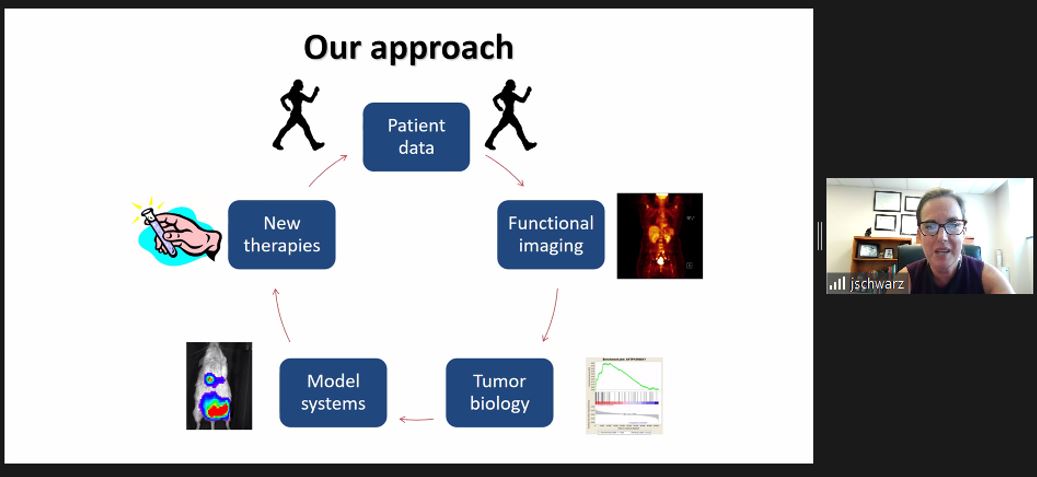We so appreciate the significant contributions of Li Lan, PhD, and Clemens Grassberger, PhD, as Associate Directors of the Program. As both Li and Clemens move on to new career challenges at other institutions, they leave the Program in great shape!



We so appreciate the significant contributions of Li Lan, PhD, and Clemens Grassberger, PhD, as Associate Directors of the Program. As both Li and Clemens move on to new career challenges at other institutions, they leave the Program in great shape!


In collaboration with the Miyamoto Lab, we seek a Postdoctoral Research Fellow for an exciting project aimed at precisely measuring the induction and repair of DNA double-strand breaks across the human genome.
In particular, we are interested in characterizing exogenous double-strand breaks such as those produced by ionizing radiation. To achieve this, the fellow will adapt and implement nucleosome-resolution genomic mapping techniques in human cancer cell lines. Combination treatments with DNA damage response inhibitors may reveal novel therapy approaches that can be translated into patients within a few years. There will also be integration with biophysical modeling of DNA repair and high-throughput screening as part of a multidisciplinary NIH-funded program grant.
A M.D. and/or Ph.D. in oncology, molecular/cellular biology, pathology, or a related field is required. The successful candidate will be highly motivated and a team player with a strong interest in an academic career in cancer research. Applicants should have experience with genomics approaches such as DNA sequencing, library preparation, and bioinformatics analyses.
Apply:
We are seeking an applicant with training and research experience in molecular biology/oncology to carry out an exciting NCI-funded, multidisciplinary project aimed at elucidating the biological effects of proton radiation in cancers. Specifically, we seek to characterize genome wide DNA damage caused by proton radiation and damage responses as a function of tumor genotype. Combinations of protons with targeted drugs will be examined as well. We hope that discovery of biomarkers predicting proton sensitivity will impact the care of cancer patients within the next few years.
Expertise in molecular biology, genomics/bioinformatics, radiation biology, or/and DNA repair is desirable.
Applicants must have a Ph.D. and/or M.D., appropriate research experience, strong organizational, interpersonal, communication, and computer skills and be excited to work in a dynamic team environment.
We are thankful and honored to have received an award from the MGH Warshaw Institute to establish a high-throughput screening platform for 3-dimensional models of pancreatic cancers. We will test novel combination treatments that include proton radiation. Our work will provide a resource for other investigators and critical preliminary data for future investigations into biologically optimized proton radiation.
July 2021
Henning Willers, MD & Chris Ott, PhD, Co-PIs
MGH Dept of Radiation Oncology & Center for Cancer Research
We are thrilled to welcome Emily for an in-person lab internship. So nice to be (slowly) getting away from the virtual world we were stuck in for too long. Emily participates in a Summer Program to Advance Research Careers (SPARC), a 12-week intensive research experience focused on emerging technologies in cancer and cancer disparities. She’ll learn about our robotic high-throughput screening project with radiation and targeted drugs!
https://www.dfhcc.harvard.edu/research/cancer-disparities/students/sparc/
We offer a position in an exciting, topical, and fast-moving field of translational cancer research. The objective of our studies is to advance precision medicine concepts in the treatment of cancer patients with radiation and specifically proton radiation. The project is centered on whole exome sequencing of tumor tissues from patients and correlative lab studies to characterize the cellular response of genomically characterized tumor cells and tissues to radiation. Collectively the studies will identify predictive biomarkers and mechanisms of enhanced sensitivity of tumors to proton radiation. Techniques include handling of tissues specimens from patients, DNA extraction, mammalian cell culture, PCR, immunofluorescence microscopy, Western blotting, and others. We seek a highly motivated individual with a strong interest in an academic career and prior wet lab experience. The research project is institutionally funded and part of the Radiation Biomarker Research Program in the Department of Radiation Oncology.
Change this description

On April 27, 2021, We were thrilled to host our first radiation/cancer biology Grand Rounds speaker, Dr. Julie Schwarz, Professor of Radiation Oncology, Vice Chair of Research, and Director of the Cancer Biology Division at Washington University. She gave an inspiring lecture on using functional imaging and cancer genomics for predicting radiation sensitivity of cervical cancers.

Today we launched a new series -inspired by Science Mondays in the Cancer Center- to focus on radiation science related topics. Great interest on our first Zoom meeting in reviving collaborations in the radiation/immuno-oncology space. Together, we can lift each other up!